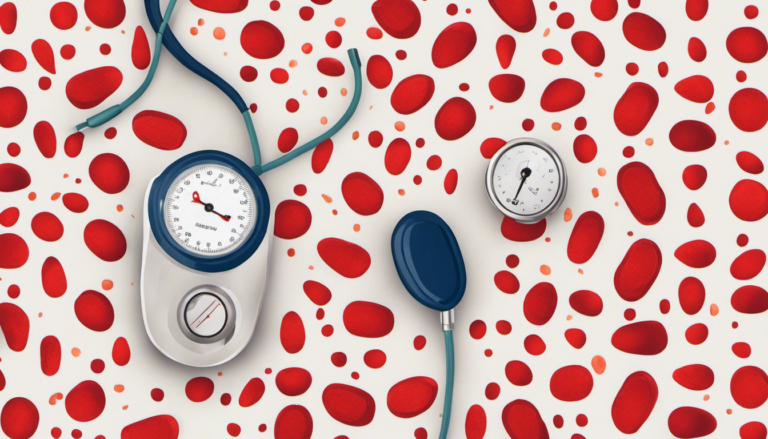The Gut-Brain Connection: The role of gut health in mental well-being.
Imagine, if you will, a bustling, modern metropolis – all steel towers and sparkling lights, crowded highways and non-stop action. Now picture a serene, ancient forest – a sea of green, untouched and thriving, pulsing with life in its quiet, deliberate way. At first glance, these two vivid scenes might seem worlds apart, yet they co-exist within you, in your gut and your brain respectively. Two dramatically different landscapes tied together by a mysterious, unseen bridge – a bridge that’s only now beginning to reveal its secrets and its pivotal role in our mental well-being. Welcome to the fascinating universe of the gut-brain link, a relatively new field of study standing stubbornly on frontiers of the known medical science, preaching the urgent relevance of gut health in ways we had never imagined before. Brace yourself as we dive deep into the complexities of the gut-brain connection, and explore how our ‘second brain’ – the gut, blindly drives our emotions, moods, and consequently, our overall mental health. After all, as they say, the way to a person’s heart – or in this case, a healthy mind - might very well be through the stomach!
Table of Contents
- Unwinding the Ties Between the Gut and the Brain
- Delving into the Role of Gut Health in Keeping the Mind Sound
- Activating Positive Mental Well-being through Balanced Gut Biomes
- Reclaiming Mental Wellness: Gut-Driven Dietary and Lifestyle Changes
- Q&A
- In Conclusion
Unwinding the Ties Between the Gut and the Brain
Intricate and compelling as the brain may seem, its health and function are often continued reflections of what’s happening in our gut. Also known as the ‘second brain,’ gut microbiota plays a significant role in our emotional health, broadly influencing our behavior and neurochemicals which regulate nerve function.
Research has revealed a complex communication system between the gut microbiota and the brain – highly influential in aspects such as:
- Stress responses
- Mood regulation
- Sleep patterns
- Cognitive functioning
The findings advocate the importance of dietary choices, shedding light upon food’s far-reaching impact, that voyages beyond mere physical wellness to mental well-being as well.
Gut health, a formerly overlooked keystone, today poses a powerful role in our total mental and emotional homeostasis. When the gut is inflamed or imbalanced, it signifies distress signals to the brain, which can contribute to a broad variety of mental health conditions, including anxiety, depression, autism, and even neurodegenerative diseases like Alzheimer’s and Parkinson’s.
A deeper understanding of the gut-brain axis has the potential to revolutionize the way we comprehend and approach mental health treatments. So foster your gut health, it’s far more than a companion for food digestion and absorption spells, but a vital component taking the leading edge in maintaining your psycho-emotional balance.
Delving into the Role of Gut Health in Keeping the Mind Sound
Often referred to as the ‘second brain’, our guts house an intricate network of neurons and a vast microbiome that plays a crucial role in our overall well-being. Even more fascinating, emerging studies indicate a significant link between gut health and our mental health. In this intertwined biological relationship, the health of one can impact the other, unveiling a new approach to understanding and improving mental health issues.
The human gut is teeming with a complex ecosystem of bacteria, known as the gut microbiota. Its harmony or dysbiosis can impact various facets of our health, including cognitive function and mood.
- Probiotics, beneficial bacteria, can produce neurotransmitters, like serotonin and dopamine, which play key roles in mood regulation.
- A variety of harmful bacteria can prompt inflammation and stress responses that may potentially link to anxiety and depression.
Beyond bacteria, the vagus nerve forms a direct information highway between the gut and brain, allowing them to influence each other constantly. Comprehending the gut-brain axis can lead to novel methods in supporting mental health through nurturing gut health.
Activating Positive Mental Well-being through Balanced Gut Biomes
Modern science has increasingly been unraveling the intricate relationship between our gut and our mental well-being. A diverse and balanced gut microbiome can contribute significantly to our overall mental health, influencing factors like stress, anxiety, and mood. Recent studies on the ‘gut-brain axis,’ a term used to describe the bidirectional communication between the gut microbes and the brain, have revealed intriguing insights. Evidently, our gut and brain ‘talk’ to each other, and this conversation can greatly shape our mental state and behavior.
Some key elements in this conversation come from our diet. What we eat ultimately determines the types of microbes that flourish in our gut. Consuming a variety of nutrient-dense foods can help foster a healthy gut microbiome, thereby promoting positive mental well-being. So what can we include in our diet?
Daily Probiotics: Consuming foods rich in probiotics aids in maintaining a healthy gut. This includes foods like yogurt, kimchi, and sauerkraut. Probiotic supplements can also be an alternative if these foods aren’t appealing to your palate.
Lots of Fiber: Feed your beneficial gut bacteria with plenty of high fiber foods such as fruits, vegetables, and whole grains. These help in the production of short-chain fatty acids, which have been linked with reducing symptoms of mental health disorders.
Limit Processed Foods: Try to limit processed foods as they can disturb the balance and diversity of the gut microbiome.
Remember, our gut is often referred to as our ‘second brain.’ Taking care of it by balancing our gut biome can pave the way to overall wellness, which includes our mental well-being. Don’t underestimate the power of your gut bacteria!
Reclaiming Mental Wellness: Gut-Driven Dietary and Lifestyle Changes
Surprisingly, the key to mental wellness could quite literally be in your gut. Ongoing research in the fascinating field of psychobiotics uses pioneering microbiome theories to explain the influence of gut health on our mental well-being. A balanced gut microbiome plays a critical role in mental health, consequently, regulating mood, behavior, stress responses, and other cognitive functions.
Often termed as ’second brain’, the gut consist of a complex network of neurons producing neurotransmitters. One of the essential benefits of a healthy gut is its production of serotonin a neurotransmitter that helps regulate sleep, appetite, mood, and pain. It’s astonishing to know that nearly 90% of the body’s serotonin is produced in the gut. Therefore, endorsing a gut-friendly diet and making positive lifestyle alterations could be instrumental to mental health.
Adopting gut-driven dietary changes needs to be a gratifying process rather than an overnight transformation. Here are a few ideas to get started:
- Fermented foods: Foods like yogurt, kimchi, and sauerkraut aid the growth of beneficial gut bacteria, promoting serotonin production.
- Diverse diet: A varied diet rich in whole foods like fruits, vegetables, legumes and whole grains can lead to a diverse microbiota, which is beneficial for gut health and mental wellbeing.
- Prebiotic food: Foods like bananas, onions, and garlic aid in nourishing gut bacteria, leading to improved serotonin production.
Equally important is improving lifestyle to support gut health. Exercise regularly, get adequate sleep, avoid nicotine, and minimize alcohol consumption. All these steps along with a healthy diet can help balance the gut microbiome and improve mental health.
Q&A
Q: What is the gut-brain connection?
A: The gut-brain connection is a term for the communication channel between our digestive system and our brain. It’s a part of what’s known as the body’s gut-brain axis, which includes the brain, glands, immune cells, and gut microbes.
Q: How does our gut affect our mental well-being?
A: Our gut microbiota significantly impacts our mood and behaviour. Various studies suggest links between gut health and mental health. Imbalances in gut health can lead to mental health problems like anxiety and depression.
Q: Can changes in gut health cause mental issues?
A: Research suggests that changes in our gut’s health, such as a decrease in diversity or an overgrowth of certain types of bacteria, could trigger neurological and psychological disorders, ranging from Autism Spectrum Disorder to Parkinson’s Disease.
Q: What factors influence our gut health?
A: Many factors influence our gut health, including diet, exercise, antibiotic usage, and even personal stress levels. The first step to achieving better gut health is often adjusting these lifestyle components.
Q: How can I promote a healthy gut-brain connection?
A: Eating a diverse range of high-fibre foods, getting regular exercise, adequate sleep, and managing stress can all contribute to a healthier gut-brain connection. Probiotics and prebiotics can also aid in supporting gut health.
Q: How can gut health contribute to happiness?
A: Serotonin, a neurotransmitter that contributes to the feeling of happiness and well-being, is produced in significant quantities in our gut. Poor gut health could limit serotonin production, which can negatively affect our mood.
Q: Could improving my gut health alleviate symptoms of anxiety and depression?
A: While there’s a lot we don’t yet understand about the gut-brain axis, some studies suggest that improving gut health can alleviate symptoms of mental health conditions. However, it’s essential to consult a healthcare professional before making any significant changes to your health regimen.
Q: Should I take probiotics to improve my mental well-being?
A: Probiotics can be an excellent supplement to a healthy diet and can help improve gut health. However, it’s important to remember that the gut-brain connection is complex, and probiotics alone are not a quick fix for mental health concerns.
Q: Are there future implications for mental health treatment concerning the gut-brain connection?
A: Research into the gut-brain connection is still in its early stages, but findings so far are promising. Some scientists are hopeful that future mental health treatments could target the gut microbiome, opening up alternative treatment pathways for conditions that are currently difficult to manage.
In Conclusion
As we bid adieu to this enlightening journey through the intricate maze of our mind and gut, it’s time to digest the essence of this symbiotic relationship. The idea that our mental well-being is feathered with the whispers of our gut calls for a paradigm shift in our understanding of health. Appreciating the gut-brain dialogue expands the horizon of our perspective, illuminating the profoundly interconnected nature of our body. Remember, to nurture the mind, it’s important we also feed the silent dialogue in our belly. The key to emotional stability, cognitive flexibility, and mental well-being might just lie in the world within us, our gut. To greater awareness and better health- Let’s tune in to the symphony of our gut-brain connection!







